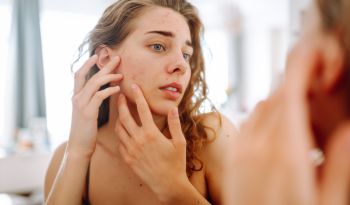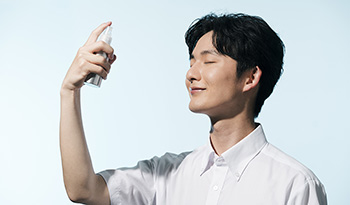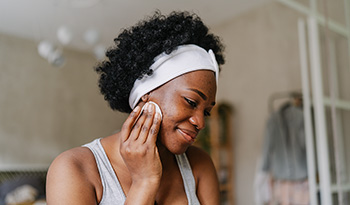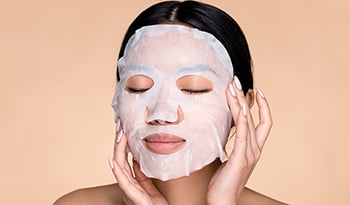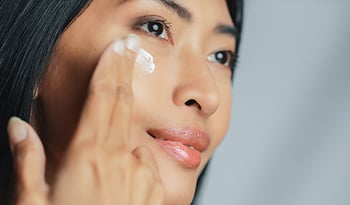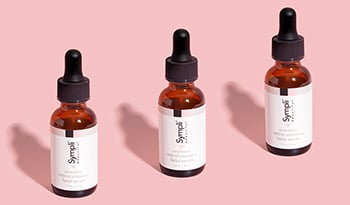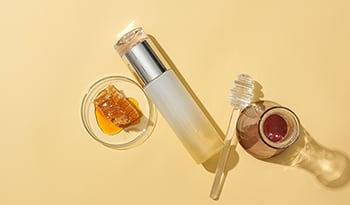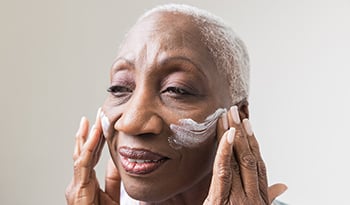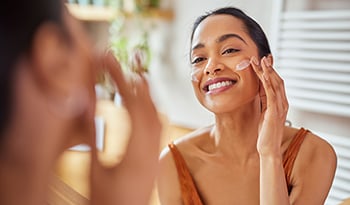The Best 9 Supplements for Acne

What Is Acne?
Acne vulgaris is a common skin condition affecting approximately 15 percent of the world’s population. Acne causes pimples, blackheads, and red, tender bumps to form on the skin. Acne is a chronic condition that occurs when hair follicles are plugged with oil and dead skin cells. It is considered an inflammatory disorder. While acne is most prevalent in teens, it may appear in older people as adult-onset acne. Although acne is more common in women, the more severe forms of the disease are observed in men.
What Causes Acne?
Intake of certain dietary nutrients may contribute to acne. For example, dairy contains hormones such as progesterone and testosterone precursors that can impact the skin negatively. Also, high glycemic index foods may indirectly lead to sebum (oil) overproduction, leading to infection with Cutibacterium acnes that causes inflammation in the follicles.
Other factors can contribute to acne formation, including stress, family history, cigarette smoking, hormonal changes, puberty, pregnancy, endocrine conditions, medications, and beauty products with high oil content, such as moisturizers, creams, and cleansers. Considering all the risk factors, you are most likely to experience acne during puberty due to the hormonal changes that trigger oil production. Puberty-onset acne typically resolves once you become an adult, but it does not always.
There are many approaches to acne treatment, including pharmaceuticals, topical ointments, chemical peels, medical procedures, and natural supplements.
Which Supplement Is Best for Acne?
Here, we will explore the top supplements and natural approaches for acne.
Vitamin A
Found in many orange and yellow foods, vitamin A is an antioxidant that can help promote healthy skin by protecting against free radicals and keeping inflammation at bay. Antioxidants like vitamin A may also help decrease skin aging by minimizing cellular damage. Eating vitamin A-rich foods like green leafy vegetables, cantaloupe, mangoes, salmon, and apricots may help promote better skin health.
A fat-soluble vitamin, vitamin A is a potential substitute for the pharmaceutical treatment isotretinoin in acne management for some people. Research is mixed regarding oral vitamin A supplements for acne. One recent study found that oral vitamin A in the form of isotretinoin at 20 mg per day was effective for treating acne vulgaris. Other research has found that while oral vitamin A was not effective at treating acne, it may prevent acne from worsening.
Taking vitamin A orally can be tricky because it is a fat-soluble vitamin. Fat-soluble vitamins A, E, D, and K can build up in the body and cause toxicity symptoms. This risk is not associated with water-soluble vitamins B and C, where excess is urinated out of the body with a very low risk of toxic levels accumulating. Because of this, it is important to follow the instructions on dosing for vitamin A supplements and to watch out for toxicity symptoms which could include drowsiness, irritability, nausea, vomiting, and abdominal pain.
There is also the risk of seizures, headache, and blurred vision due to acute vitamin A toxicity causing elevated intracranial pressure. Chronic vitamin A toxicity can lead to itchy skin, muscle or bone pain, high cholesterol, hair loss, loss of appetite, and liver damage. Birth defects are associated with excessive vitamin A intake during pregnancy. Acute vitamin A toxicity happens quickly when an adult takes several hundred thousand international units (IUs) of vitamin A. Chronic vitamin A toxicity may occur over time in adults who regularly take more than 25,000 IUs a day. The recommended daily value of vitamin A for people ages four and up is 5,000 IUs.
Because of the risks associated with oral vitamin A, many treatment approaches use a topical form of vitamin A called retinol or retinoid. The American Academy of Dermatology states retinol can help to prevent and treat inflammatory acne breakouts by decreasing inflammation evening skin tone, increasing skin cell growth to help heal scars, and protecting against environmental damage while decreasing sebum production and inflammation.
Topical vitamin A does show the most promise for acne treatment, considering other routes of administration of the vitamin. With a minimum dose of 0.25 percent vitamin A in a topical ointment or cream, you could see improvements in acne vulgaris. As with any product, do a patch test on a small section of your skin away from your face, such as the inside of your arm, before applying to your face to ensure no negative side effects such as redness or peeling occur. Wait 24 hours before determining if the product causes a reaction on the patch test area.
Retinoids can increase your sensitivity to the sun. Wearing sunscreen daily can help protect your skin from UV radiation damage.
If you are looking to improve, prevent, or treat your acne naturally, topical vitamin A, low-dose vitamin A supplements, and vitamin A-rich foods could be the solution you are looking for.
Zinc
An essential mineral in your diet, zinc is known for being a natural acne treatment option. Its anti-inflammatory properties may help relieve irritation and redness found in moderate to severe acne. In addition, zinc may also help reduce the appearance of acne lesions and scars.
Ensuring you get enough zinc in your diet is the first step to utilizing zinc as an acne treatment. Foods rich in zinc include beans, nuts, red meat, whole grains, poultry, and fortified cereals. Dairy is also high in zinc; however, dairy may contribute to acne breakouts in some people.
If you are not getting enough zinc in your diet, a zinc oral supplement could be warranted. Zinc can be found as a stand-alone supplement and is commonly found in multivitamins.
If you eat too much zinc or if you take excessive amounts of a zinc supplement, then you could experience unwanted side effects such as numbness and weakness in your extremities, headache, diarrhea, abdominal pain, loss of appetite, or nausea and vomiting. Oral zinc could also interfere with certain pharmaceutical medications including those used for autoimmune conditions and antibiotics.
Like vitamin A, topical zinc could be a good option for treating acne. Mild acne appears to be most improved with topical zinc application. Also, note that acne patients tend to have decreased serum zinc levels. One study found those with acne had significantly lower serum zinc levels compared to controls. Patients who were treated with zinc had a significant improvement in mean inflammatory papule count compared to those who were not treated with zinc. The researchers also noted there was no significant difference in the incidence of side effects in zinc supplementation compared to the control group who did not receive zinc.
A patch test would also be recommended for a zinc topical product to ensure no allergic reaction before applying it to your face. Sometimes a negative reaction may still occur on the face even with no reaction on the scratch test. If redness, hives, or irritation occur, discontinue the use of the product, and wash it off your face.
Zinc could be a good option if you have mild or inflammatory acne or acne scars.
Tea Tree Oil
Tea tree oil may help treat acne breakouts thanks to its anti-inflammatory and antibacterial properties.
Several studies have determined tea tree oil is a viable alternative for acne vulgaris therapy. One such study found that participants who applied tea tree oil twice a day for 12 weeks had significant improvement for mild to moderate acne with no serious side effects.
Another study found that a topical combination of tea tree oil and resveratrol resulted in less bacteria and oil on the skin along with smaller pores. Each of these findings could improve or prevent acne breakouts.
One additional study found that tea tree oil is both antimicrobial and anti-inflammatory. Both of these properties would help explain the positive benefits tea tree oil has on acne vulgaris.
It is important to do a patch test and to dilute tea tree oil before use. You want to put a few drops of tea tree oil in a teaspoon of carrier oil like almond or grapeseed oil. Complete the patch test, and then apply the oil combination to the affected area after gently washing with an acne cleanser. Apply once a day for best results.
Topical application of tea tree oil could be a good natural remedy for acne-prone skin.
Additional Acne Supplements
The following are additional supplements shown to help improve or prevent acne breakouts or reduce acne scarring.
- Antioxidants: The data from a scientific study suggests that oxidative stress plays a key role in acne progress and may be employed as a biomarker index to assess the disease's activity and to monitor its treatment.
- Omega 3 Fatty Acids: There is some evidence that fish oil supplementation is associated with an improvement in overall acne severity, especially for individuals with moderate to severe acne.
- Selenium: Selenium regulates sebum production and has anti-inflammatory properties.
- Vitamin D: A study found that people with cystic acne who had low vitamin D levels were at risk of developing more severe symptoms. Another study found that when people with acne took oral vitamin D supplements, their symptoms improved significantly.
- Vitamin C: Also known as ascorbic acid, vitamin C is anti-inflammatory and may help reduce redness and swelling related to acne when used topically. Therefore, it may improve the appearance of acne lesions. Vitamin C treats acne scars by increasing the synthesis of collagen, a protein responsible for your skin’s structure and essential for rebuilding healthy skin. As a result, vitamin C may accelerate the healing of acne scars.
- Vitamin E: Vitamin E is an antioxidant and has anti-inflammatory properties that may help improve inflammatory acne.
The Big Picture
Acne can be treated with various oral and topical supplements, whether mild, moderate, or severe. Some are best for prevention, while others are better at improving scarring after the inflammatory process.
While vitamin A, zinc, and tea tree oil are each touted to be acne-improving supplements, many others can help improve or prevent acne breakouts. Finding the best product for your skin and acne type may take some trial and error.
Be sure to talk to your doctor before taking any new supplements for acne treatment.
References:
- Al-Niaimi F, Chiang NYZ. Topical Vitamin C and the Skin: Mechanisms of Action and Clinical Applications. J Clin Aesthet Dermatol. 2017;10(7):14-17.
- Al-Shobaili HA. Oxidants and anti-oxidants status in acne vulgaris patients with varying severity. Ann Clin Lab Sci. 2014;44(2):202-207.
- Chan H, Chan G, Santos J, Dee K, Co JK. A randomized, double-blind, placebo-controlled trial to determine the efficacy and safety of lactoferrin with vitamin E and zinc as an oral therapy for mild to moderate acne vulgaris. Int J Dermatol. 2017;56(6):686-690. doi:10.1111/ijd.13607
- Cook M, Perche P, Feldman S. Oral Vitamin A for Acne Management: A Possible Substitute for Isotretinoin. J Drugs Dermatol. 2022;21(6):683-686. doi:10.36849/JDD.6781
- Decker A, Graber EM. Over-the-counter Acne Treatments: A Review. J Clin Aesthet Dermatol. 2012;5(5):32-40.
- El-Akawi Z, Abdel-Latif N, Abdul-Razzak K. Does the plasma level of vitamins A and E affect acne condition? Clin Exp Dermatol. 2006;31(3):430-434. doi:10.1111/j.1365-2230.2006.02106.x
- Hasamoh Y, Thadanipon K, Juntongjin P. Association between Vitamin D Level and Acne, and Correlation with Disease Severity: A Meta-Analysis. Dermatology. 2022;238(3):404-411. doi:10.1159/000517514
- Khayef G, Young J, Burns-Whitmore B, Spalding T. Effects of fish oil supplementation on inflammatory acne. Lipids Health Dis. 2012;11:165. Published 2012 Dec 3. doi:10.1186/1476-511X-11-165
- Kotori MG. Low-dose Vitamin "A" Tablets-treatment of Acne Vulgaris. Med Arch. 2015;69(1):28-30. doi:10.5455/medarh.2015.69.28-30
- Lim SK, Ha JM, Lee YH, et al. Comparison of Vitamin D Levels in Patients with and without Acne: A Case-Control Study Combined with a Randomized Controlled Trial. PLoS One. 2016;11(8):e0161162. Published 2016 Aug 25. doi:10.1371/journal.pone.0161162
- Malhi HK, Tu J, Riley TV, Kumarasinghe SP, Hammer KA. Tea tree oil gel for mild to moderate acne; a 12 week uncontrolled, open-label phase II pilot study. Australas J Dermatol. 2017;58(3):205-210. doi:10.1111/ajd.12465
- Olson JM, Ameer MA, Goyal A. Vitamin A Toxicity. [Updated 2023 May 14]. In: StatPearls [Internet]. Treasure Island (FL): StatPearls Publishing; 2023 Jan-. Available from: https://www.ncbi.nlm.nih.gov/books/NBK532916/
- Podgórska A, Puścion-Jakubik A, Markiewicz-Żukowska R, Gromkowska-Kępka KJ, Socha K. Acne Vulgaris and Intake of Selected Dietary Nutrients-A Summary of Information. Healthcare (Basel). 2021;9(6):668. Published 2021 Jun 3. doi:10.3390/healthcare9060668
- Podgórska A, Puścion-Jakubik A, Markiewicz-Żukowska R, Gromkowska-Kępka KJ, Socha K. Acne Vulgaris and Intake of Selected Dietary Nutrients-A Summary of Information. Healthcare (Basel). 2021;9(6):668. Published 2021 Jun 3. doi:10.3390/healthcare9060668
- Pullar JM, Carr AC, Vissers MCM. The Roles of Vitamin C in Skin Health. Nutrients. 2017;9(8):866. Published 2017 Aug 12. doi:10.3390/nu9080866
- Ruamrak C, Lourith N, Natakankitkul S. Comparison of clinical efficacies of sodium ascorbyl phosphate, retinol and their combination in acne treatment. Int J Cosmet Sci. 2009;31(1):41-46. doi:10.1111/j.1468-2494.2008.00479.x
- Wang K, Jiang H, Li W, Qiang M, Dong T, Li H. Role of Vitamin C in Skin Diseases. Front Physiol. 2018;9:819. Published 2018 Jul 4. doi:10.3389/fphys.2018.00819
- Yee BE, Richards P, Sui JY, Marsch AF. Serum zinc levels and efficacy of zinc treatment in acne vulgaris: A systematic review and meta-analysis. Dermatol Ther. 2020;33(6):e14252. doi:10.1111/dth.14252
DISCLAIMER:This Wellness Hub does not intend to provide diagnosis...
















































































 Table of Contents
Table of Contents



